Top 15 Fruits Highest in Sugar

Fruit is an excellent source of nutrients, providing water, fiber, vitamins, and antioxidants. Fruit contains natural sugars, however, these 'intrinsic' sugars naturally occurring in fruits, vegetables, and milk are not the ones we need to be concerned about.
Although we don’t need to reduce our consumption of sugars occurring naturally in fruits, they do still count toward our daily total sugar intakes. People needing to control their blood sugar intakes (such as diabetics) may also find it useful to know which fruits are higher in sugar.
Fruits high in natural sugar include litchis, passion-fruit, pomegranates, mangoes, cherries, oranges, kiwifruit, grapes, guavas, and bananas. In the listing, both the grams of sugar and teaspoons of sugar per serving of each fruit is given. A packed teaspoon of granulated sugar is equal to 4 grams.
Below is a list of fresh fruits high in sugar. For more see the extended lists of less common fruits high in sugar, dried fruits high in sugar, and the unfiltered list of over 100 fruits high in sugar.
-
Up to 15% Sugar
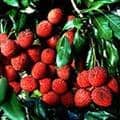 1. Litchis (Lychees)
1. Litchis (Lychees)
Sugar per Cup Sugar per 100g 29g (7 tsp) 15g (3.8 tsp) -
Up to 11% Sugar
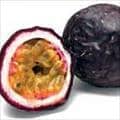 2. Passion-Fruit (Granadilla)
2. Passion-Fruit (Granadilla)
Sugar per Cup Sugar per 100g 26g (7 tsp) 11g (2.8 tsp) -
Up to 14% Sugar
 3. Pomegranate
3. Pomegranate
Sugar per Cup Sugar per 100g 24g (6 tsp) 14g (3.4 tsp) -
Up to 14% Sugar
 4. Mangos
4. Mangos
Sugar per Cup Sugar per 100g 23g (6 tsp) 14g (3.4 tsp) -
Up to 13% Sugar
 5. Cherries
5. Cherries
Sugar per Cup Sugar per 100g 20g (5 tsp) 13g (3.2 tsp) -
Up to 12% Sugar
 6. Bananas
6. Bananas
Sugar per Cup Sliced Sugar per 100g 18g (5 tsp) 12g (3.1 tsp) -
Up to 9% Sugar
 7. Oranges
7. Oranges
Sugar per Cup Sugar per 100g 17g (4 tsp) 9g (2.3 tsp) -
Up to 9% Sugar
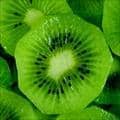 8. Kiwifruit
8. Kiwifruit
Sugar per Cup Sugar per 100g 16g (4 tsp) 9g (2.2 tsp) -
Up to 16% Sugar
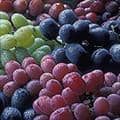 9. Grapes
9. Grapes
Sugar per Cup Sugar per 100g 15g (3.7 tsp) 16g (4 tsp) -
Up to 9% Sugar
 10. Guavas
10. Guavas
Sugar per Cup Sugar per 100g 15g (3.7 tsp) 9g (2.2 tsp) -
Up to 10% Sugar
 11. Pears
11. Pears
Sugar per Cup Sugar per 100g 14g (3.4 tsp) 10g (2.4 tsp) -
Up to 10% Sugar
12. Apples
Sugar per Cup Sugar per 100g 13g (3.2 tsp) 10g (2.6 tsp) -
Up to 8% Sugar
 13. Peaches
13. Peaches
Sugar per Cup Sugar per 100g 13g (3.2 tsp) 8g (2.1 tsp) -
Up to 8% Sugar
14. Papaya
Sugar per Cup Sugar per 100g 11g (2.8 tsp) 8g (2 tsp) -
Up to 8% Sugar
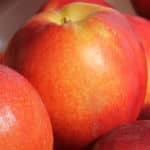 15. Nectarines
15. Nectarines
Sugar per Cup Sugar per 100g 11g (2.8 tsp) 8g (2 tsp)
Less Common Fruits High in Sugar
| Food | Serving | Sugar |
|---|---|---|
| 1. Tamarind | 1 cup pulp | 47g (11.8 tsp) |
| 2. Fried Plantains | 1 cup | 37g (9.3 tsp) |
| 3. Mamey Sapote | 1 cup chopped | 35g (8.8 tsp) |
| 4. Jackfruit | 1 cup | 31g (7.8 tsp) |
| 5. Soursop | 1 cup | 30g (7.5 tsp) |
| 6. Breadfruit | 1 cup | 24g (6 tsp) |
| 7. Persimmon | per fruit | 21g (5.3 tsp) |
| 8. Cherimoya | 1 cup | 21g (5.3 tsp) |
Sugar in Dried Fruits
| Food | Serving | Sugar |
|---|---|---|
| 1. Raisins | 1 cup | 108g (27 tsp) |
| 2. Zante Currants | 1 cup | 90g (22.5 tsp) |
| 3. Dried Peaches | 1 cup | 67g (16.8 tsp) |
| 4. Dried Apples | 1 cup | 49g (12.3 tsp) |
| 5. Dried Bananas | 1 cup | 47g (11.8 tsp) |
| 6. Dried Apricots | per cup | 15g (3.8 tsp) |
| 7. Dates (Deglet Noor) | per 3 dates | 13g (3.3 tsp) |
About the Data
Data for the curated food lists comes from the USDA Food Data Central Repository.
You can check our data against the USDA by clicking the (Source) link at the bottom of each food listing.
Note: When checking data please be sure the serving sizes are the same. In the rare case you find any difference, please contact us and we will fix it right away.
From the Nutrient Ranking Tool
Use the ranking tool links below to select foods and create your own food list to share or print.
- Foods High in Sugar
- Foods Low in Sugar
- Vegetables High in Sugar
- Fruits High in Sugar
- Vegetarian Foods High in Sugar
- Nuts High in Sugar
- Beans High in Sugar
- Dairy High in Sugar
- Breakfast Cereals High in Sugar
- Fast Foods High in Sugar
View more nutrients with the nutrient ranking tool, or see ratios with the nutrient ratio tool.
Related
Data Sources and References
Try the recipe nutrition calculator, or daily meal planner.
Create a free account to log and track foods.

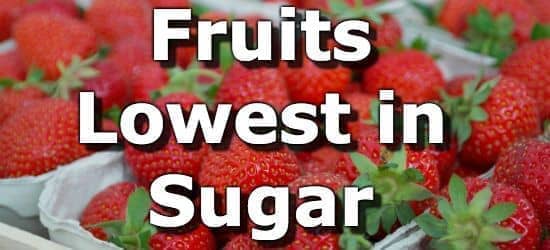 Next ➞
Next ➞